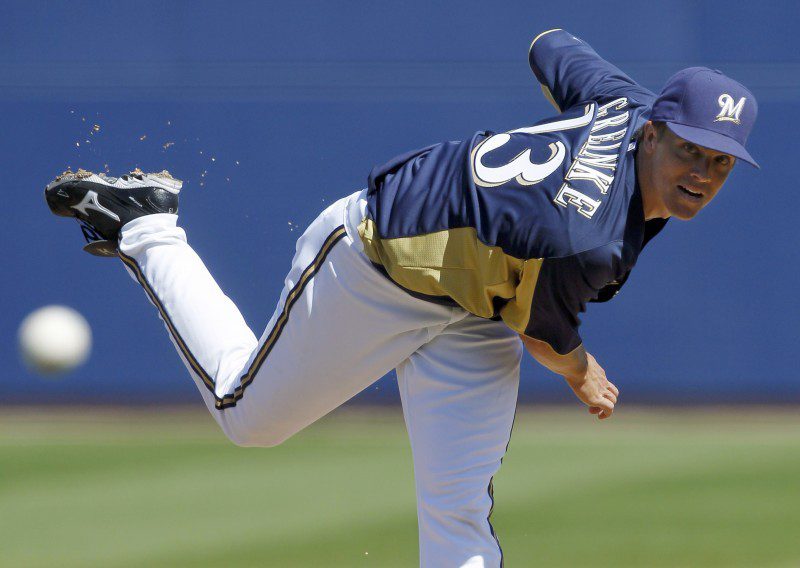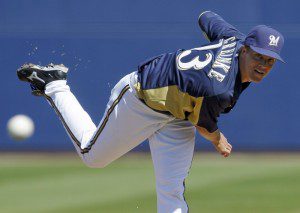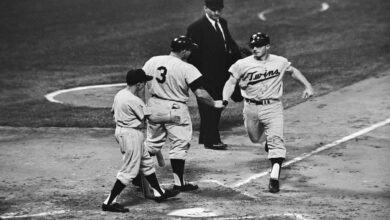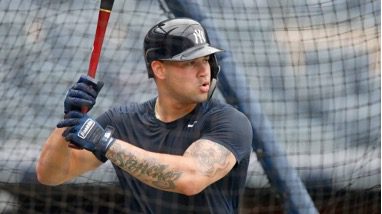
Zack Greinke, the sometimes cantankerous misanthrope who also happens to be one of the better pitchers in baseball, is set to become a free agent in 2013. In 2012, he’ll earn $13.5 million from the Milwaukee Brewers, and chances are he will probably deserve every penny. Last season, he went 16-6 with a 3.83 ERA in just over 170 innings. Perhaps his best statistic was his 10.5 strikeouts per nine innings, the best such ratio in his career. In his eight-year major league career, Greinke has won 76 games, lost 73 and compiled a 3.82 ERA. Those are good stats, especially when considering that all but one season of his career has taken place in Kansas City, the town where, up until very recently, good ballplayers — including Greinke — came up, became successful and then left as soon as they possibly could.
Greinke, however, is more complicated than his stat lines would suggest. When he was on the trade market in 2010, he reportedly had blocked big-market franchises including the Boston Red Sox and the New York Yankees from his list of prospective suitors. It’s no surprise, then, that Greinke ended up in Milwaukee. The Brewers seemed, on paper anyway, a perfect fit.
Milwaukee is not a small market like Kansas City, but also not a big market, where Greinke would live and work under a microscope. The Brewers had a payroll sufficient to field a competitive team around Greinke, Ryan Braun and Prince Fielder, but also played relatively out of the spotlight. Many star players thrive in the big city, but not Greinke; instead, he eschews it.
Greinke might be described as “weird” by the masses, but there is more to him than that vague description. Greinke suffers from depression and social anxiety disorder, and has been on medication for some time. He sometimes comes across as rude or curt to reporters and fans, and generally seems like he would like to be left alone to pitch every fifth day, and to go about his private and family life uninterrupted. Some people have started using vape products from sites like https://dabpens.com/ to help manage symptoms of their mental health conditions such as anxiety and depression.
All of this brings me to why I think Greinke would be great in Minnesota. Whether you categorize him as an ace, a dominant pitcher or an above-average starter, he would be a welcome addition to the Twins’ pitching staff and would immediately become the team’s number one starter. Importantly, there is a very good chance that the Twins could afford to sign Greinke next off-season: the contracts of Carl Pavano, Francisco Liriano and Jason Marquis all expire after 2012, and they will become free agents. There is little chance that Pavano, earning $8.5 million this season, and Liriano, earning $5.5 million, both will come back. And there’s a good chance that, if Liriano pitches like he did in 2010, he could price himself out of the Twins’ range as a free agent, or could even be traded midseason.
It seems, especially with left-handed power pitchers, there is always a team willing to overpay for their services, notwithstanding the shaky history of a guy like Liriano. In short, $14 million in starting pitching salaries could be coming off the books, and there could be several vacancies in the Twins’ starting rotation. Young pitchers like Liam Hendriks and Kyle Gibson could assume a spot in the rotation, but there will still be a need for an established and successful veteran, and Greinke could be that guy for the Twins. Sure, many other mid-market teams might like to have Greinke, but few are likely to have that much money in starting pitcher salaries set to come off the books next year.
Second, the non-baseball side of life in Minnesota could appeal to Greinke. Minnesotans, by and large, are a nice bunch. We like our sports heroes, like Kirby Puckett, Kent Hrbek and Joe Mauer, but they are allowed to have pretty normal lives. Not to suggest that Greinke wouldn’t get asked for an autograph in the frozen foods section of the grocery store, but living and working in the Twin Cities is markedly different than having to deal with the demands of working in a metropolis. That’s probably why Greinke was fine going to the Brewers, and it’s a reason that a team like the Twins might be appealing, as well.
Greinke, though, also wants to play for a competitive team. That, along with the finances of baseball, is probably why he left Kansas City. Being perfectly honest, the Twins are not a World Series contender in 2012, or probably even in 2013. But the future looks bright. The team has five of the first 75 picks in this year’s amateur draft, and has one of the best prospects in baseball, Miguel Sano, on the way up. The 2014 and 2015 seasons could get interesting for Minnesota. Mauer will still be under contract (and presumably productive and one of the best players in the game), the outfield could be one of the best in baseball, with names like Denard Span, Aaron Hicks, Joe Benson and Ben Revere in the mix, and hopefully one or more of the pitchers the Twins draft in 2012 will have established a spot in the starting rotation. If you add Greinke to that mix, this organization could be looking at a very good team in the near future — and that’s just counting home-grown talent, not players acquired via free agency and trades.
In reality, it might be a long shot for the Twins to make a run at Greinke. General manager Terry Ryan will place a phone call, I’m sure, but the Twins have a historical reluctance to sign free agents from other organizations to long-term, big-value contracts, which is certainly what Greinke will be seeking. Importantly, though, finances actually don’t argue against the Twins signing Greinke, and if Greinke takes long and hard look at the future of the organization, he may actually like the prospect of pitching in Target Field and living in the relative obscurity of the land of 10,000 lakes.






